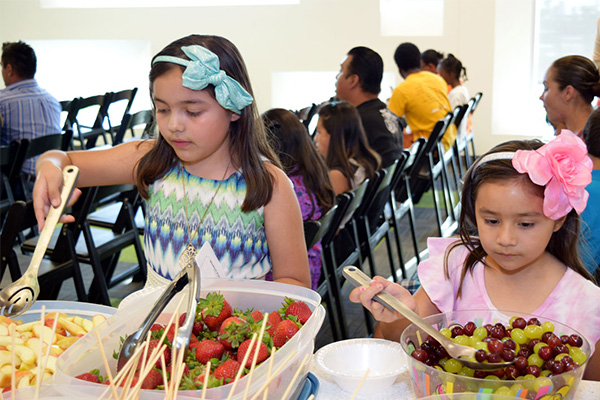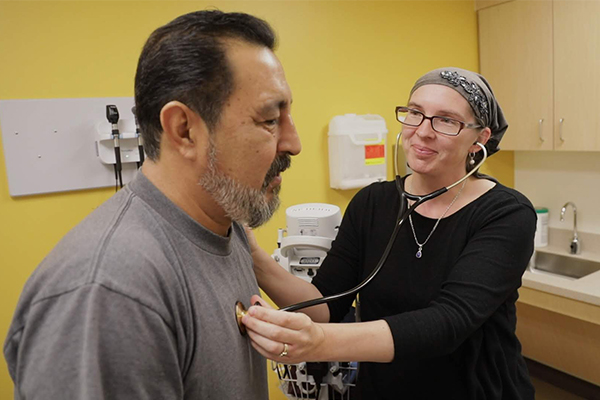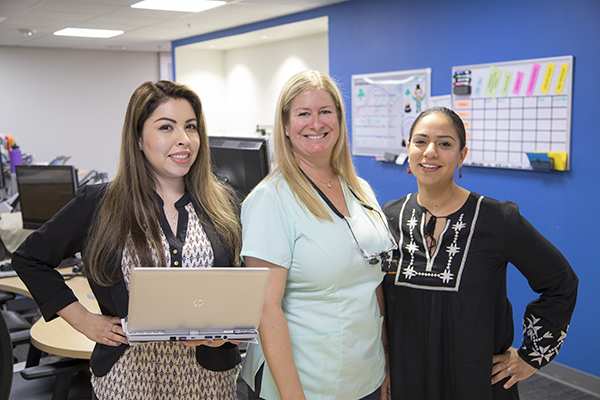March 01, 2016 | Clinics
National Nutrition Month takes place every March. We at Mountain Park have an amazing nutrition department and team that help our patients improve their health and overall wellbeing. Saray Vera is one of many Registered Dietitians working with our patients at Mountain Park. An Arizona State University graduate, Saray started her studies focusing on Spanish, and after a summer internship at a community health center interpreting for physicians and dietitians, she fell in love with the healthcare world. While studying Spanish, she started a concurrent degree in nutrition, with a focus on diabetes after her mom’s diagnosis with the condition. Saray began working at Mountain Park in September 2014 shortly after receiving her degree. We got to talk with Saray about what Mountain Park has to offer our patients, how to instill healthier eating habits and what diabetic and heart patients should do to stay on track.
Q. What is one thing that patients should know about when receiving dietary care from Mountain Park?
A. The first thing I want the patients to know is that our nutrition service is a part of their care. Even if they are the healthiest person on the planet, they can still see one of our nutritionists in order to make better choices about diet and their overall wellbeing. We offer various classes, such as diabetes education, weight management and kids’ nutrition classes. We have a lot to offer that people don’t know about.
Q. Why type of patients do you see at Mountain Park?
A. We serve all patients, insured/uninsured, families, husbands, wives, siblings, patients who are interested in improving their health, patients who are ill and want to get better… we serve everyone.
Q. How do you customize each patient’s care?
A. As dieticians we try to find out what’s motivating the patient and use that to determine what exactly they’re ready to change or do. We evaluate their readiness and customize care to different wants, needs and capabilities in order to be successful.
Q. We know it’s very important to introduce great eating habits at a young age. Do you have any suggestions or advice for parents on how to start their kids on a healthy eating path?
A. The first thing I tell parents is to be a good example. Instill in your child at a young age that it’s great to have fruit, vegetables and low-fat dairy. Present these healthy options at home. A lot of parents may not make them available, so making them accessible is a priority. Also, don’t give up. Encourage children to try foods again and again, even though they may say they don’t like them. It may take several tries until they discover that they really do like apples, for example. And the last piece of advice is try to present food in a different way, whether they be grilled or cooked, in soup or inside a sandwich.
Q. What are some foods you would recommend everyone incorporate into their diet for a healthier lifestyle?
A. Following MyPlate is the biggest recommendation that any Registered Dietitian would give. Sticking to whole fruits and vegetables, whole grains, lean proteins, low-fat dairy and water is a great path to success.
Q. What are your top three overall health tips?
A. Eat healthy, move daily and think positively. People don’t realize that your mind has to be there to act upon a healthier lifestyle. You have to have a plan in your head to be healthy and you have to want to be healthy.
Q. What is one piece of advice you would give a patient if they had to change their eating habits?
A. Start somewhere, set a realistic goal and share it with someone, whether it be a family member, your RD or physician, for accountability and follow up.
Q. Tell us about the classes you teach at Mountain Park. What do you enjoy about them and what are some takeaways for participants?
A. I’ve always been passionate about education and helping people. Teaching about diabetes is important to me because the more you educate the more you will get the word out in the community. It’s nice knowing that it’s making a bigger impact than for those just those sitting in the classroom.
Our Act Now Weight Management classes are our 12-series nutrition/exercise class that allow participants to meet with me once a week for 12 weeks and monitor their weight loss journey. I provide patients with one-on-one feedback on their food logs and recommendations for improvement.
These classes are open to all patients and their family and friends. The classes are held at our Baseline, Maryvale and Gateway clinics.
Q. What are two foods that sound like they are great for a person’s diet, but really aren’t?
A. Juices are a pet peeve of mine. Whether they are 100 percent grape juice, smoothies, anything, it’s not the best option. People don’t realize that even though it’s fruit, there is a ton of sugar in there. For those with diabetes or those trying to lose weight I say stay away. Also, foods with the word “low” on the label, people don’t realize that because the food is low in one macronutrient, it usually means it’s higher in another macronutrient to compensate for the flavor. Education is so important in these cases.
Q. What is a primary change that a diabetic/cardiac patient should make in their life to improve their condition?
A. Once again, education! People have to seek education and knowledge with these areas. After education I would say taking medication as prescribed is crucial. Doctors know what they are doing, they’re giving you medication but also watching the diet and exercise. The trio works together. For diabetes it’s important to eat low-sugar, low-carb foods and for cardiac conditions low-fat and heart healthy foods are a must.
For more information, please email info@mphc-az.org



